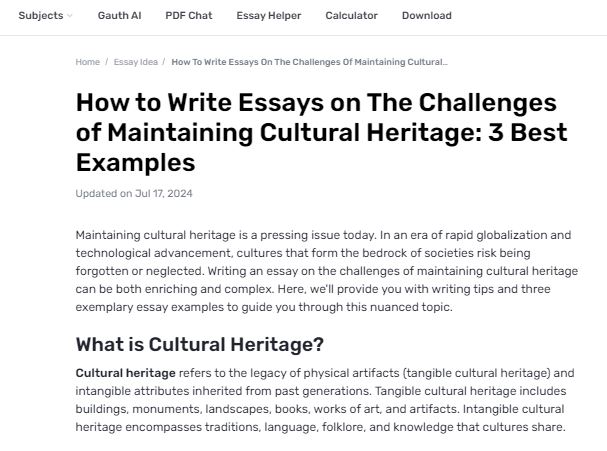Maintaining social heritage is essential for protecting the personality, history, and values of social order. Anyway, this endeavor is full of different socially demanding situations that complicate the endeavors of people, groups, and governments. Cultural heritage encompasses both tangible components like monuments, artifacts, and buildings, and intangible elements which include traditions, dialects, and ceremonies.
The social challenges in retaining cultural background often emerge from issues related to globalization, modernization, socio-monetary changes, political instability, and evolving social attitudes. This exposition explores these Challenges of Maintaining Cultural Heritage in-depth, highlighting their implications and conceivable techniques for overcoming them.
Globalization and Social Homogenization
One of the most noteworthy social challenges in maintaining a social legacy is the pervasive impact of globalization. Globalization advances social trade and interaction but also leads to social homogenization, where dominant societies overshadow local traditions and customs. This can result in the erosion of unique social personalities as individuals embrace more universally prevalent lifestyles, languages, and practices.
Modernization and Urbanization
Modernization and urbanization bring around significant social and social changes. As societies modernize, conventional ways of life are frequently disturbed, and social hones may be deserted or adjusted to fit unused ways of life. Urbanization, in particular, can lead to the uprooting of communities and the devastation of social locales. In quickly developing cities, notable neighborhoods and buildings are frequently supplanted with modern infrastructure, leading to the misfortune of substantial legacy.
Socio-Economic Changes
Socio-economic changes moreover pose a challenge to maintaining cultural heritage. Financial improvement and shifts in jobs can lead to changes in social structures and needs. For occurrence, conventional creates and skills may decrease as individuals pursue more profitable and less labor-intensive occupations. In numerous creating nations, financial weights drive communities to offer social artifacts or repurpose memorable buildings for commercial uses.
Political Instability and Conflict
Political instability and conflict are among the most serious dangers to cultural heritage. Wars, respectful distress, and political turmoil can lead to the think pulverization of social locales and artifacts. Famous illustrations incorporate the pulverization of the Bamiyan Buddhas in Afghanistan and the deliberate focus on legacy destinations in Syria and Iraq.
During conflicts, social legacy is regularly focused on to erase the personality and history of a community.
Evolving Social Attitudes
Advancing social states of mind displays another challenge in maintaining cultural heritage. As social orders alter, so do their values and perceptions of what constitutes cultural heritage. Practices that were once broadly accepted may end up disagreeable or be seen as obsolete and irrelevant. For illustration, certain conventional ceremonies or celebrations may be seen as contradictory with modern values, driving to debates over their continuation.
Intergenerational Transmission
The transmission of social legacy from one era to the next is crucial for its conservation. However, this handle is getting to be increasingly challenging. Factors such as migration, urbanization, and changing ways of life disturb the conventional modes of social transmission, such as family and community-based instructing. In numerous cases, younger eras may need intrigued or openings to memorize almost their social legacy.
Cultural Affectability and Inclusivity
Maintaining cultural heritage moreover requires affectability to the differing ways in which distinctive communities esteem and translate their legacy. Guaranteeing inclusivity in legacy conservation endeavors is basic, particularly in multicultural social orders where numerous social bunches coexist. There can be conflicts over which perspectives of social legacy ought to be prioritized and protected.
Legal and Regulation Challenges
Legal and organizational challenges moreover impede the support of social heritage. In numerous nations, there may be lacking legitimate systems and arrangements to ensure social legacy viably. International participation and bolstering can play an imperative part in tending to these challenges. Organizations such as UNESCO give systems and assets for legacy protection, but effective usage depends on solid national and nearby teachers.
Simplify Paper Writing with Gauth AI Help
Gauth is a progressed AI device designed to assist with an assortment of scholastic errands, counting, and composing expositions. Here is how to viably utilize Gauth for paper composing:

Input Your Essay Question:
Type or upload your paper question into Gauth. Utilize the "Ctrl + V" easy route to glue your address if required.
Receive AI Assistance:
Gauth uses industry-leading calculations to analyze your question. The AI will give step-by-step directions and clear clarifications.
Review Solutions:
Gauth offers detailed clarifications with how and why tips. Quickly get a well-structured solution in seconds.
Draft Your Essay:
Utilize the AI-generated substance and tips to draft your essay. Ensure the exposition is coherent and includes all vital components.
Conclusion
Maintaining cultural heritage is a challenging errand that requires tending to different social challenges. Globalization, modernization, socio-economic changes, political instability, advancing social states of mind, and intergenerational transmission issues all contribute to the challenges in protecting the social legacy. However, by receiving comprehensive, community-based, and economical approaches, it is conceivable to overcome these challenges and guarantee that social legacy proceeds to improve social order for eras to come.


